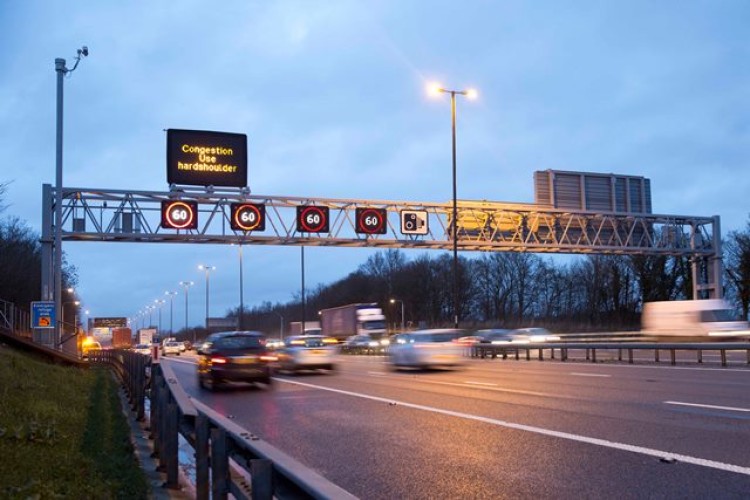Last week Doncaster coroner Nicola Mundy adjourned the inquest into the death of 62-year-old Nargis Begum, killed on the M1, and referred Highways England to the Crown Prosecution Service.
The death of Nargis Begum, killed while trying to escape from her car 16 minutes after it had broken down on a section of so-called smart motorway, is not the first time that smart motorways have come under the spotlight. The mounting public and political outcry over smart motorways prompted Grant Shapps to conduct a review last year before any further such motorway ‘upgrades’. However, the roll-out continues with only minor adjustments.
Officially, they are called ‘smart’ because they feature technology that supposedly monitors traffic flow and variable message boards flash up temporary speed restrictions for optimum traffic flow, to prevent stop-start congestion.
Smarter still, they are a way of increasing motorway capacity on the cheap by removing the hard shoulder to gain an extra running lane. Last year it emerged that the sporadic refuge zones that are meant to be provided at 500-metre intervals are in fact typically 2.5km apart. Another cunning saving by smart Highways England.
A scandalously under-reported feature of smart motorways is that the technology paves the way for automatic pay-as-you-go road tolls on motorways to compensate for the impending loss of £28bn fuel tax revenue that the Treasury will lose when we are all driving electric cars.
But no one, nowhere, has ever sought to claim that smart motorways are specifically designed to improve road safety.
In fact, the biggest revelation of last week came from Highways England’s barrister Nicholas Chapman who said that the company has “no duty of care to motorists” and had no reason to monitor traffic for stranded vehicles.
Is this really the basis of Highways England’s defence? That it has no responsibility to road safety? This is big news and worth investigating.
So we asked Highways England for further clarification on this point. Is it true that Highways England has no duty of care to motorists, we asked.
The spokesperson declined to answer directly but he supplied us with this statement: “Safety is Highway England’s number one priority and we always work to make the strategic road network safer.”
It does not take a barrister to drive a coach and horses through that claim. Hard shoulders have been removed and they have deliberately skimped on refuge areas. Safer how? (as Tommy DeVito might ask).
With Highways England reluctant to discuss the specifics of its ‘duty of care’, one must turn instead to its licence to operate, published by the Department for Transport in April 2015 (Highways England: Licence. Secretary of State for Transport statutory directions and guidance to the strategic highways company).
Paragraph 4.2.e states:
.png)
“Without prejudice to the general duties on the Licence holder under section 5 of the Infrastructure Act 2015, the Licence holder must, in exercising its functions and complying with its legal duties and other obligations, act in a manner which it considers best calculated to protect and improve the safety of the network.”
A smart-arse barrister might argue that “safety of the network” is not the same as safety on the network. Safety of the network is how well the physical infrastructure is protected from damage.
It is true that the licence document often seems to be more interested in keeping traffic moving than keeping individuals safe, but it is with this in mind that there does appear to be a duty imposed upon Highways England to monitor traffic.
Paragraph 5.1.b states that the Licence holder should: “Proactively and reactively provide relevant, accurate and timely information about traffic and conditions on the network to road users, including when there is disruption.”
It cannot proactively provide timely information about traffic without continuous, diligent monitoring.
Similarly, section 5.15 seems to clearly indicate that the Department for Transport expects Highways England to have a duty of care for road users. It states:
“The Licence holder should, when exercising functions related to safety, have due regard to the need to protect and improve the safety of the network as a whole for all road users, including:
a. Ensuring that protecting and improving safety is embedded into its business decision-making processes and is considered at all levels of operations;
b. Seeking to achieve the best possible safety outcomes across its activities, while working in the context of sustainable development and delivering value for money; and
c. Taking opportunities to engage with and support wider efforts to improve safety for road users.”
However, there remains an escape route for the smart-arse barrister in both these extracts. In each case, it says that the licence holder should – not must. The subtitle of the document, remember, is ‘statutory directions and guidance…’ These bits are therefore presumably guidance rather than direction.
Perhaps Nicholas Chapman is actually right after all, and Highways England really does not have any duty of care to road users. If so, regardless of the merits of smart motorways, that is in itself a scandal that needs swift rectification.
Got a story? Email news@theconstructionindex.co.uk
.png)


